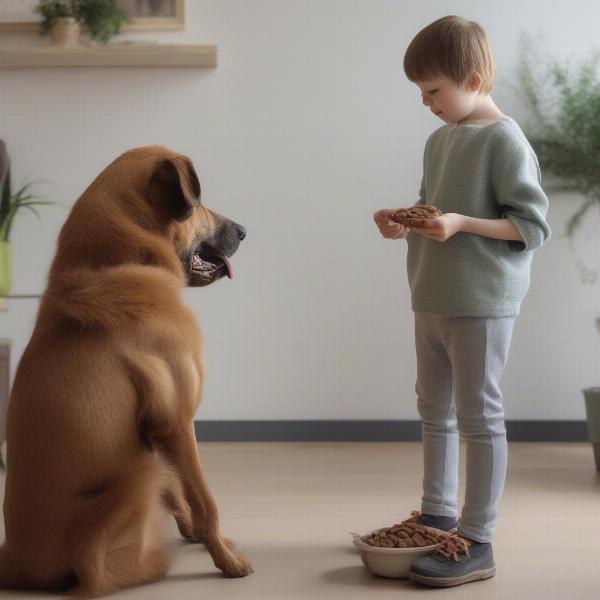A nervous dog barking at visitors can be stressful for both you and your furry friend. This behavior often stems from fear, anxiety, or territorial instincts, and while it’s a natural response for some dogs, it can be managed and improved with the right approach. This article will explore the underlying causes of this behavior and provide practical, effective strategies to help your dog feel more comfortable and confident when greeting guests.
Why Does My Dog Bark at Visitors?
Several factors can contribute to a dog’s nervous barking at visitors. Understanding these reasons is the first step in addressing the behavior. Is it fear, territoriality, or perhaps a lack of socialization? Let’s delve into the common culprits.
Fear and Anxiety
Many dogs bark at visitors because they are simply afraid. Unfamiliar sights, sounds, and smells can trigger anxiety in dogs, especially those who haven’t been properly socialized. They may perceive visitors as a threat, leading to barking as a defensive mechanism.
Territorial Instincts
Some dogs have a strong instinct to protect their home and family. They may view visitors as intruders, barking to warn them off and defend their territory. This is particularly common in breeds with guarding tendencies.
Lack of Socialization
Dogs who haven’t been exposed to a variety of people, places, and experiences during their crucial developmental period may be more prone to anxiety and fear around strangers. This can manifest as excessive barking when visitors arrive.
Effective Strategies to Calm Your Nervous Barker
Now that we understand the potential reasons behind the barking, let’s explore some proven strategies to help your dog feel more at ease with visitors.
Desensitization and Counter-Conditioning
This technique involves gradually exposing your dog to the triggers that cause their anxiety (visitors) while simultaneously associating those triggers with positive experiences, such as treats or praise. Start by having a friend or family member approach the house from a distance, and reward your dog for remaining calm. Gradually decrease the distance over time.
Create a Safe Space
Provide your dog with a designated “safe space,” such as a crate or bed, where they can retreat when they feel overwhelmed. Make this area comfortable and inviting with their favorite toys and blankets. Encourage them to go to their safe space when visitors arrive, and reward them for doing so.
Positive Reinforcement Training
Teach your dog alternative behaviors to barking, such as sitting or lying down when guests arrive. Reward them with treats and praise when they exhibit these desired behaviors. Consistency and patience are key to success with this method.
Managing Visitors at the Door
Controlling the initial interaction between your dog and visitors is crucial. Here’s how to manage greetings effectively:
Leash Your Dog
Keep your dog on a leash during initial greetings to prevent jumping or excessive barking. This allows you to maintain control and guide their behavior.
Ask Visitors to Ignore Your Dog
Instruct visitors to avoid eye contact or direct interaction with your dog until they have calmed down. This prevents reinforcing the anxious behavior by giving the dog attention when they are barking.
Reward Calm Behavior
As soon as your dog exhibits calm behavior, such as sitting or quietly observing, reward them with treats and praise. This reinforces the desired behavior and encourages them to repeat it in the future.
 Visitor Giving Dog a Treat
Visitor Giving Dog a Treat
When to Seek Professional Help
If your dog’s barking persists despite your efforts, consult a certified professional dog trainer or a veterinary behaviorist. They can assess your dog’s specific needs and develop a tailored behavior modification plan.
Conclusion
Addressing a nervous dog’s barking at visitors requires patience, consistency, and a positive approach. By understanding the underlying causes and implementing the strategies outlined in this article, you can help your dog feel more comfortable and confident when greeting guests, creating a more peaceful and welcoming environment for everyone. Remember, consistency is key!
FAQ
-
How long does it take to stop a dog from barking at visitors? The time it takes varies depending on the dog, the severity of the behavior, and the consistency of training. It can take weeks or even months to see significant improvement.
-
Should I punish my dog for barking at visitors? Punishment is generally ineffective and can worsen anxiety. Focus on positive reinforcement and rewarding desired behaviors.
-
Can medication help with my dog’s anxiety? In some cases, medication may be helpful in conjunction with behavior modification. Consult your veterinarian to discuss options.
-
What if my dog is aggressive towards visitors? If your dog displays aggression, consult a professional dog trainer or veterinary behaviorist immediately for guidance.
-
Is it too late to socialize an older dog? While it may be more challenging, older dogs can still learn and adapt. Patience and a gradual approach are essential.
-
Can I use a bark collar to stop my dog from barking? Bark collars can be aversive and may worsen anxiety. Positive reinforcement methods are generally more effective and humane.
-
What if my dog only barks at certain types of visitors? This may indicate a specific fear or trigger. Observe your dog’s behavior closely to identify patterns and address the underlying cause.
Related Articles
About ILM Dog
ILM Dog is your trusted source for expert advice on all aspects of dog care, from breed selection and health to training, nutrition, grooming, and much more. We provide practical, evidence-based information to help you nurture a happy and healthy relationship with your canine companion. Whether you’re a seasoned dog owner or just starting your journey, ILM Dog offers valuable resources to support you every step of the way. For personalized guidance, contact us via email at [email protected] or call us at +44 20-3965-8624.